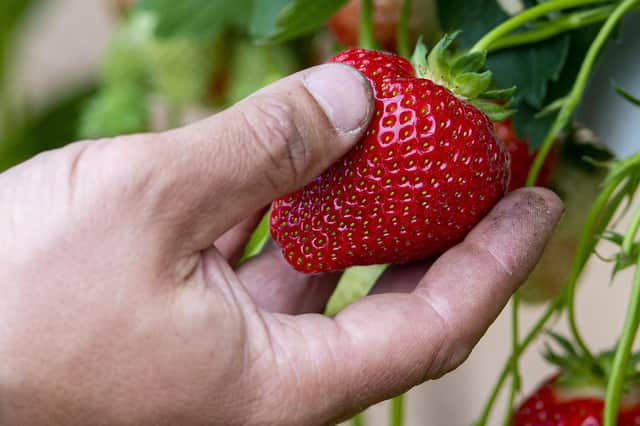Farming: Fruit and veg alert after Seasonal Worker visas blow


Terming the Home Office’s decision to maintain the number at 30,000 for 2022 but to scale this back figure back in future years, as “deeply disappointing” NFU Scotland said that the decision showed a complete disconnect from the industry.
“The seasonal workers visa scheme is an essential route to get the workers needed for fruit, veg and ornamental sectors,” said NFU Scotland president, Martin Kennedy.
Advertisement
Hide AdAdvertisement
Hide Ad“Plans to start dismantling the scheme are a blow and mean some very difficult decisions will have to be made about future production. “
He said that there had been a shortfall of labour of around 20 per cent in 2021 which had lead to significant losses and millions of pounds worth of food rotting in the fields: “Indications are that Scotland will produce a lot less fruit and veg next year and an announcement that will initially keep the number of seasonal visas for the UK static at 30,000 will not improve that picture.”
He said that rather than cutting numbers the scheme should have been extended to allow more of this essential labour into the country for six months – adding that the Home Office’s focus on hiring UK staff showed a huge naivety on the matter despite repeated briefings from NFU Scotland and others.
He said: “Let’s be perfectly clear, failure to secure UK workers is not for want of trying. Our survey of fruit and vegetable members in September 2021 found one Scottish fruit and veg business that had offered 100 contracts of employment to UK applicants; six were accepted and only three turned up to work.”
Advertisement
Hide AdAdvertisement
Hide AdHe said that while the retention rate for EU and other migrant workers was over 80 per cent, the retention rate for UK workers was 32 per cent.
“Our horticultural sector punches way above its weight in Scottish agriculture, accounting for only one per cent of our land area but 16 per cent of our agricultural output. Its ongoing success is wholly dependent on securing the necessary labour.”
However, welcoming the UK government move which stated that the sector would simply have to improve pay and conditions to attract more UK workers, Scottish Secretary Alister Jack claimed the announcement was “really good news” which would give the sector some time to future proof its arrangements: “The scheme will help raise wages in the sector which, along with improved conditions, will help make agriculture more attractive to domestic workers."
He said that changes to the visa scheme, which had run since 2019, would force companies to pay those using the route a minimum salary to discourage poor conditions.
Advertisement
Hide AdAdvertisement
Hide Ad“It will also be extended to ornamental horticulture to support our distinguished flower growers in the UK.”
He argued that the changes followed a review which found the reliance on foreign labour had held down wages, disincentivised investment and discouraged uptake of jobs.
Comment Guidelines
National World encourages reader discussion on our stories. User feedback, insights and back-and-forth exchanges add a rich layer of context to reporting. Please review our Community Guidelines before commenting.